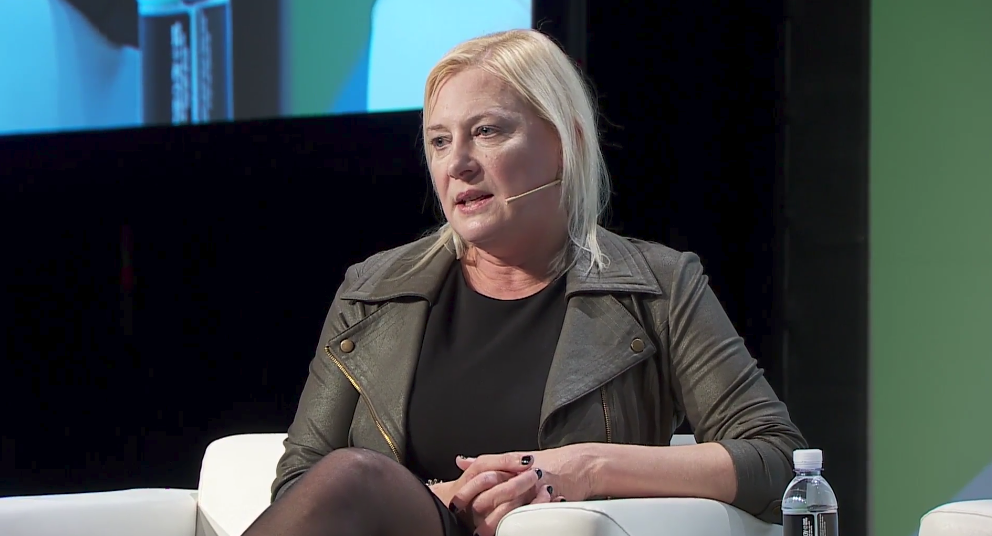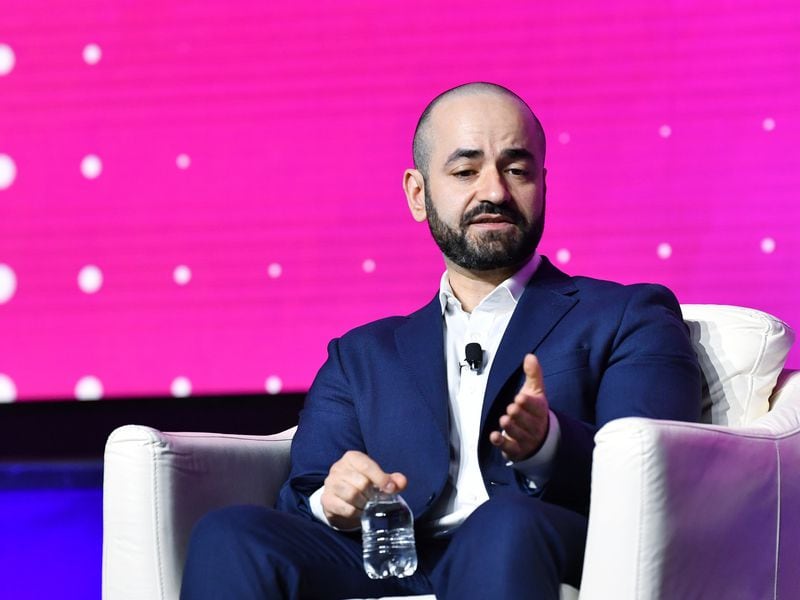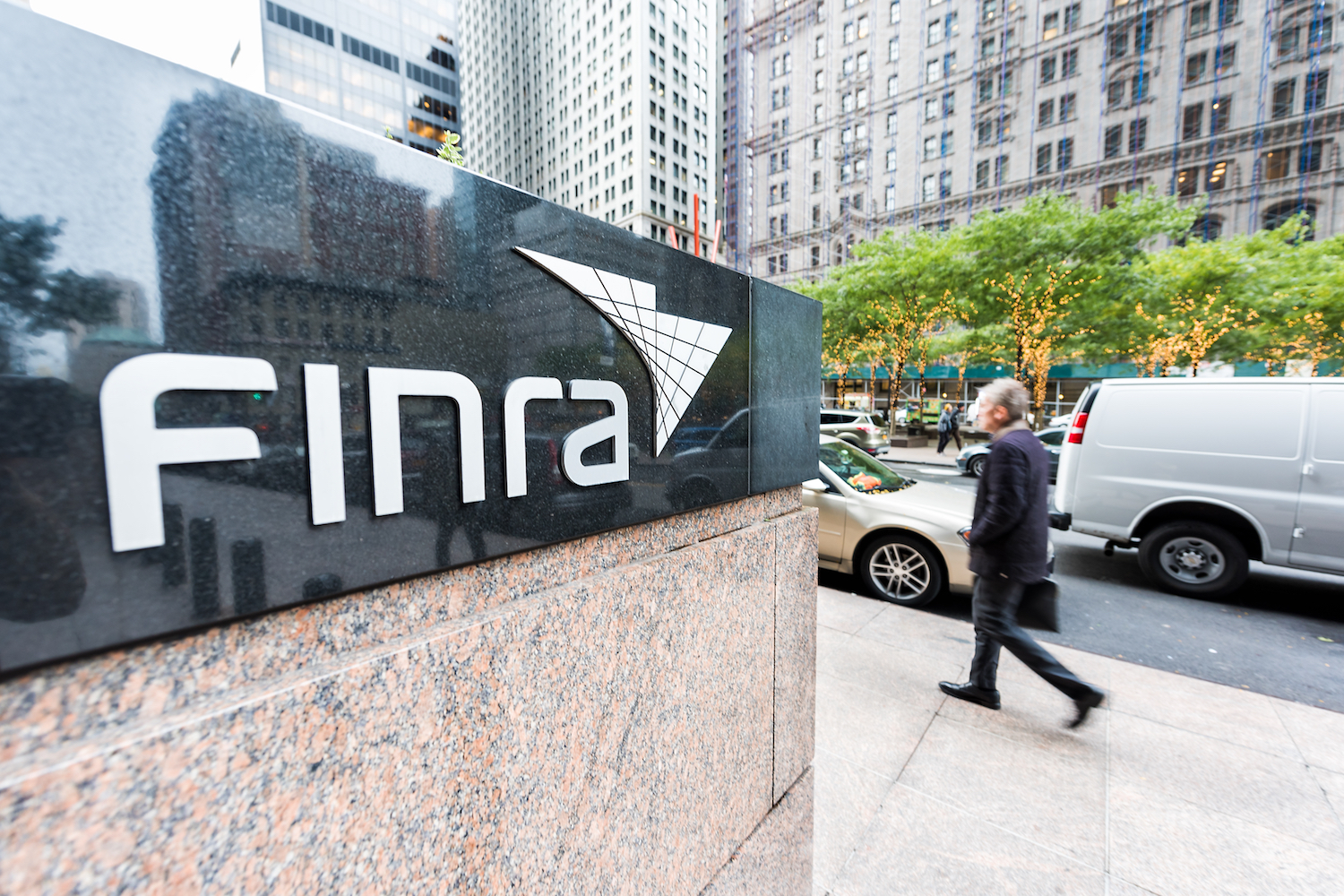Yang 2020 and the Search for the Next Crypto Candidate
Andrew Yang (left)
at Consensus 2019
Andrew Yang was the first true crypto candidate to emerge since the advent of digital currencies and blockchain technology. Yang will be remembered for his detailed crypto platform and for the genuine enthusiasm he demonstrated as an advocate for the technologies. Though he never spoke about the technologies directly during a nationally televised debate, he endorsed crypto and blockchain in a range of fora, from Facebook Live AMAs to the main stage at Consensus 2019, where he gushed, “Oh, boy, are we going to have some fun in terms of the cryptocurrency community.”
In contrast to Hilary Clinton’s sharp rejection of crypto donations in 2016 — citing concern over the perception they carried unseemly “libertarian” connotations — Yang accepted up to $2,500 in bitcoin (BTC) or ERC20 tokens, with some paperwork required. These donations supported Yang’s detailed crypto platform, including a pledge to act on “onerous regulations” that he believed have a “chilling effect” on the growth of the digital assets market. There was no hedging or ambivalence involved. The Yang2020 website stated flatly, “The blockchain has vast potential.”
To comprehend just how much of a break this was, it helps to revisit the last election cycle. In 2016, the closest thing to a “crypto candidate” was the Republican Rand Paul. Before dropping out in early February, Paul quietly accepted donations in digital currencies, but otherwise didn’t consider the young technology worthy of policy attention. Ditto the libertarian former governor of New Mexico, Gary Johnson, whose candidacy suggests the Clinton campaign’s concerns were misplaced. Despite being a self-declared libertarian, Johnson’s support among crypto investors was roughly the same as his support among the general population, which is to say negligible, around 5 percent. (Support for John McAfee’s “Don’t-ask-me-about-anything” 2016 and 2020 campaigns, meanwhile, is too negligible to quantify.)
“Yang showed people who are outside [the community] that there is a way to regulate and improve the crypto market,” said Neeraj Agrawal, director of communications at Coin Center, the crypto advocacy and policy think tank. “He was the first candidate to have a sensible crypto policy, and the first to talk about these issues in a serious way on the national stage.”

The first, but not the last. Observers in the space believe in future elections, as digital currencies gain mainstream traction, wider adoption and prominence within larger debates over U.S. monetary policy and financial regulation, candidates with platforms like Yang’s will be the rule rather than the exception.
“Yang’s campaign was a historical moment for cryptocurrency and blockchain that will lead the way for more candidates to come forward championing the technology,” said Craig Cobb, host of “The Trader Cobb Crypto Podcast.” “With a larger millennial public coming to voting age, we will see an ongoing push at all levels of politics to advance the technology that this demographic has embraced.”
***
Meanwhile, Yang has no plans to disappear. As a newly hired regular commentator on CNN, he will continue to have a voice in the national political conversation. It isn’t yet clear whether he will be in a position to directly address crypto or related issues on the country’s most-watched cable network, or if he’ll be asked to comment only on more general political subjects. But he is now one of very few people on CNN’s payroll who has a known interest and knowledge on the issue. For years, CNN did not have anyone who could credibly discuss crypto or blockchain. This changed only in 2018, when CNN International hired Julia Chatterly, who now hosts occasional crypto segments, including a recent interview with Ripple CEO Brad Garlinghouse.
On the campaign trail, Yang’s absence has created a vacuum that has yet to be filled. When Yang announced that he was suspending his campaign on the night of the New Hampshire primary, many assumed that his role as the Crypto Candidate would be taken over by former New York City Mayor Michael Bloomberg. At first glance, this transfer of allegiance did have a certain logic to it. Bloomberg’s name is associated with business and technology and, like Yang, he has a crypto plank in his platform. The Wall Street Journal reported last week that Bloomberg’s campaign has indeed made overtures to Yang, “courting the former candidate’s endorsement and floating the possibility of Mr. Yang becoming his running mate.”
But the report also stated Yang did not show enthusiasm for the idea, mirroring a tepid response to Bloomberg on the part of the so-called Yang Gang, the group of media savvy and energetic supporters that put Yang on the map with a burst of Internet memes and other forms of organic, creative organizing activity.
He was the first candidate to have a sensible crypto policy, and the first to talk about these issues in a serious way on the national stage.
There are a number of possible reasons for this, beginning with the neutral tone of Bloomberg’s crypto platform in comparison to Yang’s. Nor is there a clear overlap between Bloomberg’s wider, more traditional business constituency and the more niche crypto community that rallied behind Yang. And where Yang had an undeniable buoyancy and charisma, Bloomberg possesses the leaden anti-charisma of a self-absorbed and domineering late-career CEO.
“People were very quick to say Bloomberg is the next Yang, but he just doesn’t have the same techie-futurist vibe,” said Agrawal of Coin Center. “Bloomberg’s platform is very guarded and unspecific. It doesn’t celebrate the technologies; it just says there will be some regulation. Any overlap might just be from the fact that there are some more traditional finance types in the cryptocurrency world. But you can’t just buy the kind of meme energy that Yang had. Yang was a moonshot candidate and crypto is a moonshot thing.”
If not Bloomberg, where does the crypto voter, if such a thing exists, go from here? As suggested by Gary Johnson’s tepid support, crypto investors are not ideologically predictable and do not necessarily fit the libertarian cliché. Nor are they all Democrats, even if the Democratic Party has traditionally been the most tech-forward of the two parties. Crypto Twitter is notoriously busy with Pepe the Frog avatars and memes, suggesting that a significant minority supports the retrograde policies of the current administration.
Then there are what you might call dark-horse crypto candidates. There are, after all, a lot of ways to encourage the growth of crypto and blockchain, not all of them obvious. Four years ago, some made the case that Hillary Clinton, despite her public cryptophobia, was actually poised to become an ally and boon to the development of the underlying technology. In a July 2106 piece for TechCrunch, Brian Forde of the Digital Currency Initiative at MIT’s Media Lab argued that this was obvious when you took a closer look under the hood of Hillary Clinton’s policy goals for technology and innovation. These goals included general support for computer science and STEM education, increasing open data, and fighting for net neutrality. Then there was her low-key call for the development of “public service blockchain applications,” which got a lot less attention in the community than her rejection of crypto donations.
“Secretary Clinton embraced the technology’s potential when looking at it in the context of her call to open more data,” wrote Forde, noting that crypto allies DJ Patil and Ed Felten both served as deputy CTOs in the same administration Clinton served as Secretary of State. “Having voices like theirs at the table is powerful and having a call for public service blockchain applications opens the dialogue between policymakers in a new Administration and the cryptocurrency community.”
In a similar vein, Jon Buck of Beincrypto.com has more recently argued that the election of Bernie Sanders, a candidate more closely associated with universal health care and income inequality than tech issues, could be an unexpected boon to the growth of crypto and blockchain.
Buck points to the senator’s plan to provide high-speed internet to every citizen as a “basic human right”, spreading the infrastructure key to wider participation in the sector. (This would also apply to Elizabeth Warren’s similar plank calling for heavy public investment into expanding broadband access.)
“Regardless of the political leaning,” writes Buck, “universal access to high-speed Internet would be a massive boon for bitcoin. As a digital currency, Bitcoin requires access to the internet for simple trading and transactions. While government costs may be massive, such a plan would provide access to Bitcoin for the entire country. The virtuous adoption cycle of bitcoin would mean that, as access and adoption increase, prices would also increase. And, as prices respond to greater usage, more users would certainly move into the space.”
There is another possible future for the Yang Gang, of course. They could reject all of the other candidates, and simply write “Andrew Yang” on the ballot-line marked “Other,” staying loyal to their candidate until he sends out word to gear up the machine for a second run in 2024 or 2028.
Disclosure Read More
The leader in blockchain news, CoinDesk is a media outlet that strives for the highest journalistic standards and abides by a strict set of editorial policies. CoinDesk is an independent operating subsidiary of Digital Currency Group, which invests in cryptocurrencies and blockchain startups.









